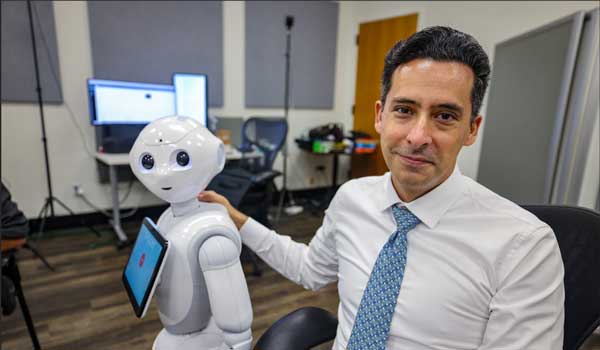Researching Artificial Intelligence to Shape Our Future and Improve Our Lives
From bolstering cybersecurity to identifying healthcare issues, artificial intelligence can be used in an amazing array of applications that provide potential solutions to the challenges we face in our daily lives.
While there is much discussion and debate about the role of artificial intelligence (AI) in our daily lives and how it will impact our future, researchers from the management information systems (MIS) department in the Fowler College of Business at San Diego State University have been looking into how AI could be used to identify and provide solutions to complex problems.
Pediatric Mental Health
Aaron Elkins, MIS associate professor and director of the James Silberrad Brown Center for Artificial Intelligence, is leading a research team collaborating with healthcare professionals to use Pepper, the center’s humanoid robot, to help detect mental health issues — particularly bipolar disorder — in pediatric patients. While the research is in its initial stages, the team is experimenting with enabling Pepper to process AI models which would make the robot more conversational and capable of identifying youngsters who may be experiencing a mental health condition, or preventing a mental health episode.
Additionally, the center has recently begun a collaboration with San Diego-based Sharp Healthcare to use AI to manage healthcare data through the use of large language models (LLMs) and electronic health records. The eventual goal of this early-stage research is to aid in healthcare documentation by streamlining the logistical, financial, and case management processes, resulting in a more seamless medical diagnosis and treatment procedure.
Identifying Emotional Distress from Social Media Posts
Assistant professor, Vivian Huangfu, was among a group of researchers who used a machine learning algorithm to scan posts in Reddit to look for specific words and phrases linked to the development of mental health disorders.
Huangfu — founder of SDSU’s AI4Business Lab — scanned for words that might indicate emotional distress (such as “breakup”) that appeared alongside specific stressful emotions (such as “confusion,” “heartbreak,” or “jealousy”). As a result, the researchers were able to pinpoint individuals who may be experiencing issues such as depression, anxiety, bipolar disorder, eating disorders and more.
With support from the National Key Research and Development Program of China, the researchers expanded the algorithm to analyze the potential root causes of mental health conditions (financial issues or workplace conflicts, for example). The researchers were able to pinpoint the specific dates when the key words were posted on Reddit, enabling them to determine how long an individual might have started experiencing their condition. Ultimately, this information could help prevent individuals from harming themselves or others.
Enhancing Employee Experiences
The U.S. labor market in the early 2020’s saw “The Great Resignation” in which millions of American employees resigned their jobs to take other positions or to leave the labor pool entirely. Others, according to Gallup, are still employed but have become disengaged or non-productive with an estimated that $7.8 trillion was lost in productivity in 2021 compared to 2019.
To address this trend, assistant professors Morteza Safaei Pour and Hossein Shirazi, and professor Kaveh Abhari are currently studying how AI technology can be integrated into employee experience management platforms. Their goal is to find ways to motivate employees through mentoring and personalized career recommendations while maintaining a privacy-preserving environment.
The team is also investigating ways to overcome challenges associated with data gathering and analysis, personalizing the feedback to the unique needs of each employee, accommodating organizational growth, changing employee needs, and assuring the programs are effective and efficient.
“A positive employee experience leads to enhanced workplace gratification, engagement and retention, however, employee satisfaction has recently become a glaring issue,” said Abhari, founder and director of Fowler’s Digital Innovation Lab (DiLab). “Employee experience platforms are a $400 billion industry and we are currently engaged in pioneering the use of AI-driven approaches to enhancing the employee experience and subsequently improving organizational performance.”
Streamlining Supply Chain Operations
Assistant professor Carlos Paternina has been investigating how AI can be used to process large datasets and recognize complex patterns within a supply chain scenario. When an AI-generated optimization model is created to analyze existing scenarios and processes, the applications can be combined to generate efficient solutions to problem-solving across different sectors.
Paternina’s former student, Harrison Halperin, conducted a case study within a brick-and-mortar electrical supply company using generative AI to automate the company’s inventory management system. “Supply chain management operations are now poised for a revolution as generative AI streamlines operations, even in the absence of deep industry experience,” said Paternina. “The approach demonstrates the immense potential of AI to enhance inventory management practices, offering valuable insights and strategies that can be applied across a wide range of industries.”
In further studies, Paternina combined the use of AI and mathematical programming to create an application that “learns” patterns from various data platforms to create new models for previously unseen operational issues. This application can be used in a broad spectrum of industries for streamlining and optimizing business operations.
“The integration of AI and optimization models represents a formidable alliance in problem-solving and decision making across numerous sectors while automating and streamlining supply chain operations,” Paternina explained. “By harnessing AI’s data driven insights and the optimization models’ ability to identify practical solutions, organizations can achieve greater efficiency.”
These researchers are among a growing number of professors in the Fowler College of Business who are engaged in AI research.. Though most of us already use AI — either knowingly or unknowingly — on a daily basis, the technology has limitless potential to provide solutions to some of the challenges facing humanity.
¹ Scientific and Technological Innovation Programs of Higher Education Institutions in Shanxi, Grant/Award Number: 2019L0350; Natural Science Foundation of Shanxi Province, Grant/Award Number: 201901D211078; National Natural Science Foundation of China, Grant/Award Numbers: 62101376, 61772093, 62176030; Research and Development, Grant/Award Number: 2018YFB2101200; Natural Science Foundation of Chongqing, Grant/Award Number: cstc2021jcyj-msxmX0568A





